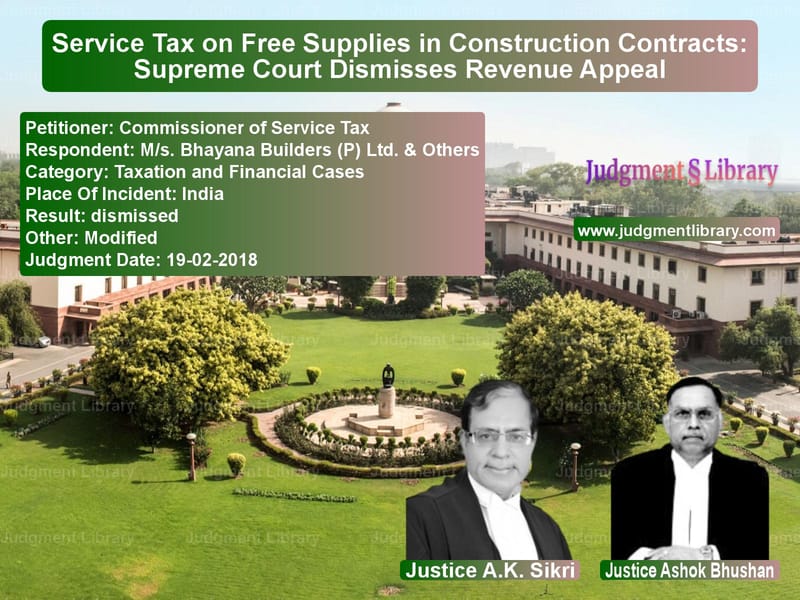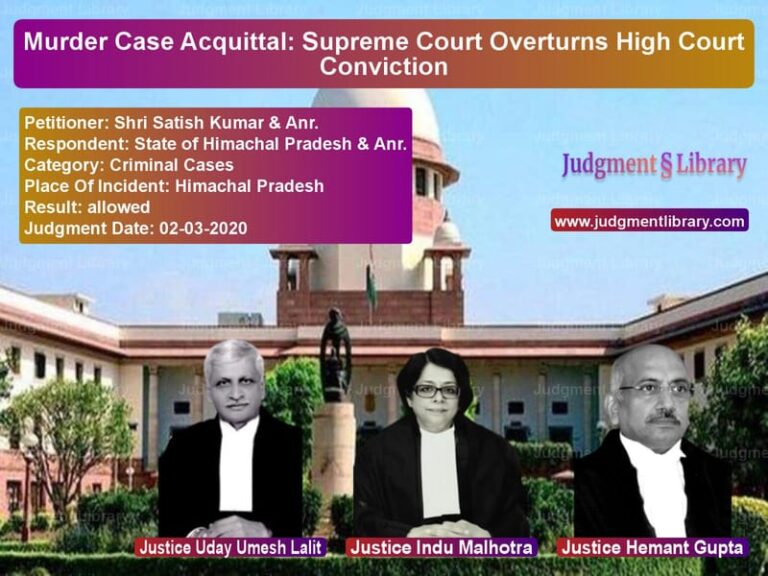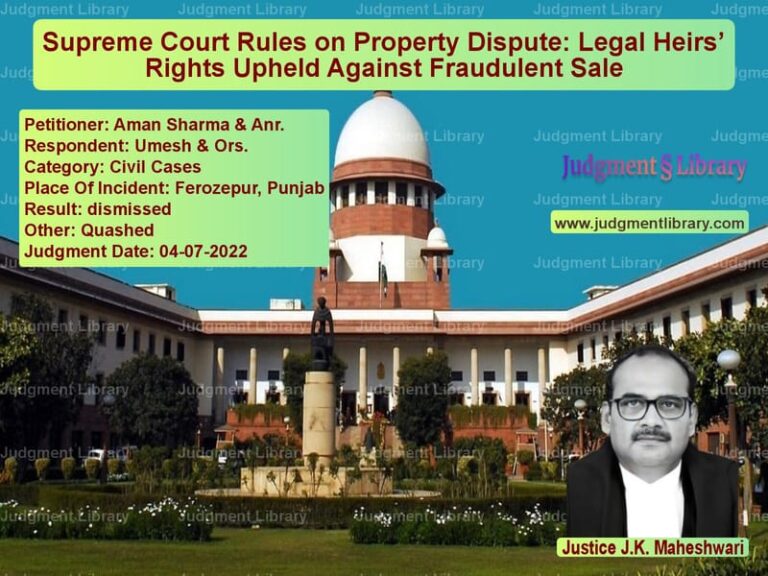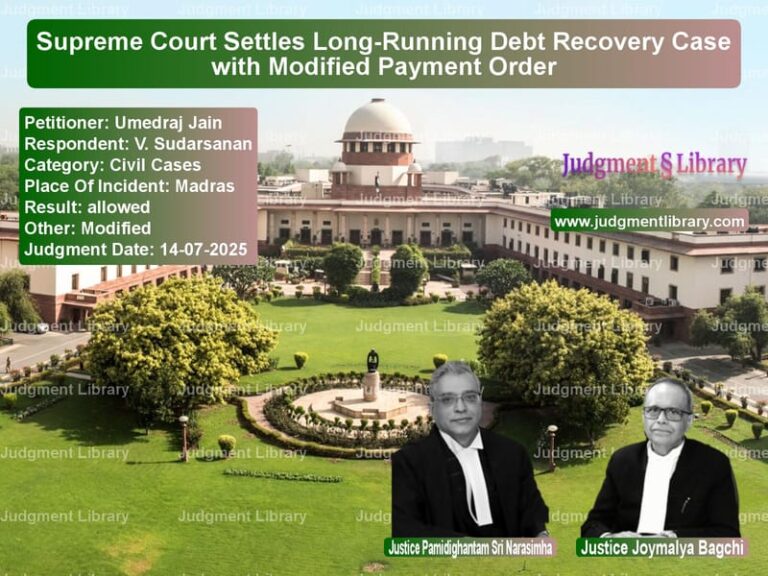Service Tax on Free Supplies in Construction Contracts: Supreme Court Dismisses Revenue Appeal
The case of Commissioner of Service Tax vs. M/s. Bhayana Builders (P) Ltd. dealt with the interpretation of service tax valuation under the Finance Act, 1994, specifically whether the value of free supplies of materials provided by the service recipient to the service provider should be included in the taxable service amount. The Supreme Court of India, in its judgment dated February 19, 2018, ruled in favor of the assessees, holding that such free supplies should not be included in the taxable amount for the purpose of service tax.
The ruling clarified an important aspect of tax liability for the construction industry, ensuring that contractors are not taxed on materials they never charged their clients for.
Background of the Case
The respondents in this case were engaged in the business of construction and were providing services under the category of ‘Commercial or Industrial Construction Service’, which was taxable under Section 65(105)(zzq) of the Finance Act, 1994. While the assessees accepted their liability to pay service tax, the dispute arose regarding the valuation of their taxable services.
The primary issue was:
- Whether the value of materials (such as steel and cement) supplied free of cost by the service recipient (the client) should be included in the calculation of service tax on the construction service.
The service tax department argued that free supplies should be added to the gross amount charged by the service provider for the purpose of calculating service tax. However, the assessees contended that since they had not charged their clients for these materials, their value should not be included in the taxable amount.
Key Legal Issues
- Does the phrase “gross amount charged” under Section 67 of the Finance Act, 1994 include free supplies provided by the service recipient?
- Whether the Central Board of Excise and Customs (CBEC) circulars and notifications justified adding free supplies to the service value.
- How should the abatement notifications (Notification No. 15/2004-ST and Notification No. 4/2005-ST) be interpreted in the context of free supplies?
Petitioner’s Arguments (Commissioner of Service Tax)
The revenue authorities contended:
“The gross amount charged by the service provider should include the value of free materials supplied by the service recipient. This is because the contractor benefits from the materials provided without cost.”
The department further argued that allowing exclusion of free supplies would lead to tax evasion, as contracts could be structured to artificially reduce the service tax base.
Respondent’s Arguments (M/s. Bhayana Builders & Others)
The assessees opposed the department’s view, arguing:
“The Finance Act, 1994 defines ‘gross amount charged’ as the amount billed by the service provider to the service recipient. Since the contractor did not charge anything for the free supplies, their value should not be included in the taxable service amount.”
The assessees also pointed out that:
- Abatement notifications were issued to simplify tax compliance, not to artificially inflate the taxable value.
- The revenue department was misinterpreting the notifications and attempting to tax a value that was never a part of the contractor’s income.
Supreme Court’s Judgment
The Supreme Court ruled in favor of the assessees, holding that:
“The phrase ‘gross amount charged’ in Section 67 of the Finance Act, 1994, refers to the amount that is actually charged by the service provider to the service recipient. Free supplies made by the service recipient are not part of this amount and therefore cannot be included in the valuation for service tax purposes.”
The Court also dismissed the argument that excluding free supplies would lead to tax evasion, noting that the law only allows taxation of amounts actually billed.
The key rulings included:
- Free supplies cannot be added to the gross amount for service tax purposes.
- The department cannot impose service tax on amounts not charged by the service provider.
- CBEC circulars and explanations cannot override the clear language of the statute.
Implications of the Judgment
This judgment has significant implications for the construction and real estate industries:
- Clarifies Tax Liability: Contractors will not be unfairly taxed on materials they did not charge for.
- Prevents Overreach by Tax Authorities: The ruling sets a precedent that service tax can only be levied on amounts actually charged.
- Provides Certainty to Businesses: The ruling removes ambiguity and provides clarity on how service tax should be calculated in construction contracts.
Conclusion
The Supreme Court’s ruling in Commissioner of Service Tax vs. Bhayana Builders is a landmark decision in service tax law. By clarifying that the value of free supplies cannot be included in the taxable amount for construction services, the Court has ensured fair treatment for contractors and prevented an unjustified expansion of the tax base.
This judgment will serve as a guiding principle for future disputes in service tax valuation and will help businesses in structuring their contracts with greater certainty.
Petitioner Name: Commissioner of Service TaxRespondent Name: M/s. Bhayana Builders (P) Ltd. & OthersJudgment By: Justice A.K. Sikri, Justice Ashok BhushanJudgment Date: 19-02-2018
Don’t miss out on the full details! Download the complete judgment in PDF format below and gain valuable insights instantly!
Download Judgment: Commissioner of Serv vs Ms. Bhayana Builder Supreme Court of India Judgment Dated 19-02-2018.pdf
Direct Downlaod Judgment: Direct downlaod this Judgment
See all petitions in Income Tax Disputes
See all petitions in GST Law
See all petitions in Tax Refund Disputes
See all petitions in Judgment by A.K. Sikri
See all petitions in Judgment by Ashok Bhushan
See all petitions in dismissed
See all petitions in Modified
See all petitions in supreme court of India judgments February 2018
See all petitions in 2018 judgments
See all posts in Taxation and Financial Cases Category
See all allowed petitions in Taxation and Financial Cases Category
See all Dismissed petitions in Taxation and Financial Cases Category
See all partially allowed petitions in Taxation and Financial Cases Category







